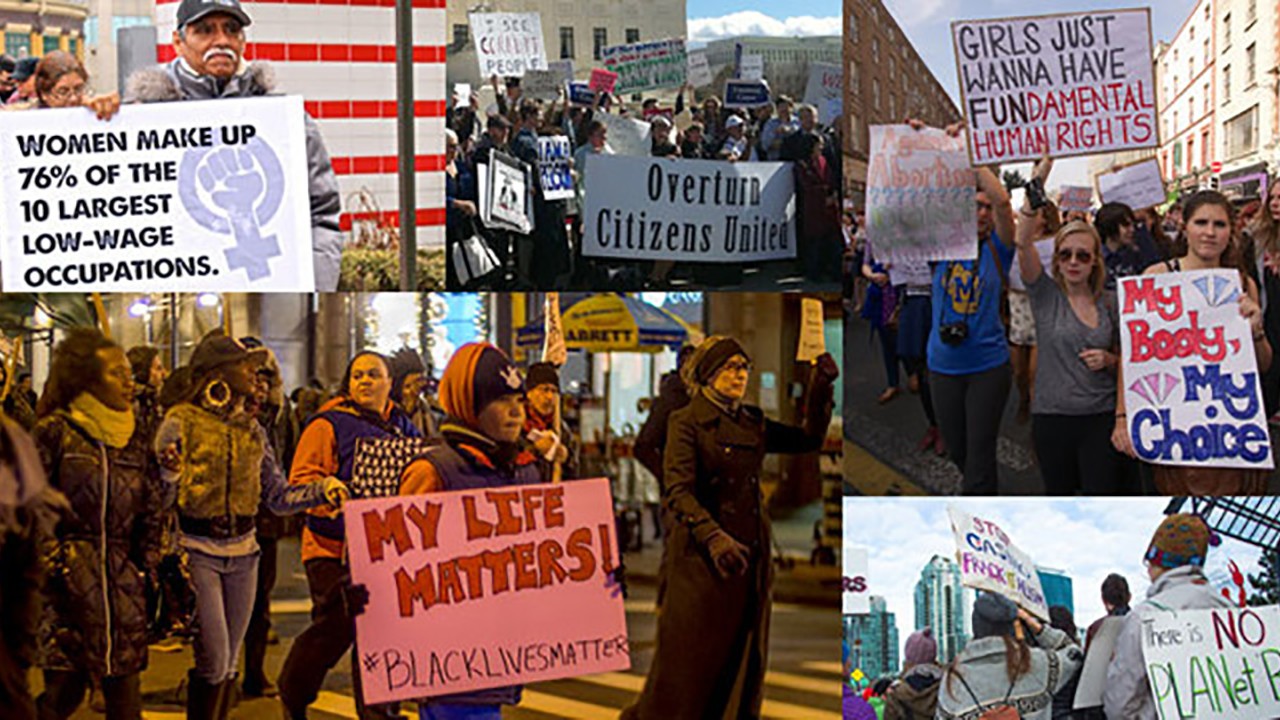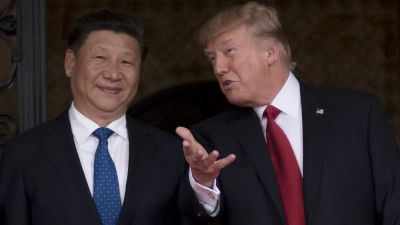
If the left is to fight back against authoritarianism, we must bring together diverse movements working for social change. (Photos: Bob Simpson, Ella , Workers Solidarity Movement, Mark Klotz, Mark Klotz / Flickr CC 4.0 Edited: JR / Truthout)
This post originally appeared at Truthout.
The United States stands at the endpoint of a long series of attacks on democracy, and the choices faced by many in the US today point to the divide between those who are, and those who are not, willing to commit to democracy. Debates over whether Donald Trump is a fascist are a tactical diversion because the real issue is what it will take to prevent the United States from sliding further into a distinctive form of authoritarianism.
The willingness of contemporary politicians and pundits to use totalitarian themes echoes alarmingly fascist and totalitarian elements of the past. This willingness also prefigures the emergence of a distinctive mode of authoritarianism that threatens to further foreclose venues for social justice and civil rights. The need for resistance has become urgent. The struggle is not over specific institutions such as higher education or so-called democratic procedures such as elections but over what it means to get to the root of the problems facing the United States and to draw more people into subversive actions modeled after both historical struggles from the days of the underground railroad and contemporary movements for economic, social and environmental justice.
If progressives are to join in the fight against authoritarianism in the United States, we all need to connect issues.
Yet, such struggles will only succeed if more progressives embrace an expansive understanding of politics, not fixating singularly on elections or any other issue but rather emphasizing the connections among diverse social movements. An expansive understanding such as this necessarily links the calls for a living wage and environment justice to calls for access to quality health care and the elimination of the conditions fostering assaults by the state against black people, immigrants, workers and women. The movement against mass incarceration and capital punishment cannot be separated from a movement for racial justice, full employment, free, quality health care and housing. Such analyses also suggest the merging of labor unions and social movements and the development of progressive cultural apparatuses such as alternative media, think tanks and social services for those marginalized by race, class and ethnicity. These alternative apparatuses must also embrace those who are angry with existing political parties and casino capitalism but who lack a critical frame of reference for understanding the conditions for their anger.
What is imperative in rethinking the space of the political is the need to reach across specific identities and stop mobilizing exclusively around single-issue movements and their specific agendas. As the Fifteenth Street Manifesto Group expressed in its 2008 piece, “Left Turn: An Open Letter to US Radicals,” many groups on the left would grow stronger if they were to “perceive and refocus their struggles as part of a larger movement for social transformation.” Our political agenda must merge the pedagogical and the political by employing a language and mode of analysis that resonates with people’s needs while making social change a crucial element of the political and public imagination. At the same time, any politics that is going to take real change seriously must be highly critical of any reformist politics that does not include both a change of consciousness and structural change.
If progressives are to join in the fight against authoritarianism in the United States, we all need to connect issues, bring together diverse social movements and produce long-term organizations that can provide a view of the future that does not simply mimic the present. This requires connecting private issues to broader structural and systemic problems both at home and abroad. This is where matters of translation become crucial in developing broader ideological struggles and in fashioning a more comprehensive notion of politics.
There has never been a more pressing time to rethink the meaning of politics, justice, struggle, collective action and the development of new political parties and social movements.
Struggles that take place in particular contexts must also be connected to similar efforts at home and abroad. For instance, the ongoing privatization of public goods such as schools can be analyzed within the context of increasing attempts on the part of billionaires to eliminate the social state and gain control over commanding economic and cultural institutions in the United States. At the same time, the modeling of schools after prisons can be connected to the ongoing criminalization of a wide range of everyday behaviors and the rise of the punishing state. Moreover, such issues in the United States can be connected to other authoritarian societies that are following a comparable script of widespread repression. For instance, it is crucial to think about what racialized police violence in the United States has in common with violence waged by authoritarian states such as Egypt against Muslim protesters. This allows us to understand various social problems globally so as to make it easier to develop political formations that connect such diverse social justice struggles across national borders. It also helps us to understand, name and make visible the diverse authoritarian policies and practices that point to the parameters of a totalitarian society.
There has never been a more pressing time to rethink the meaning of politics, justice, struggle, collective action and the development of new political parties and social movements. The ongoing violence against black youth, the impending ecological crisis, the use of prisons to warehouse people who represent social problems and the ongoing war on women’s reproductive rights, among other crises, demand a new language for developing modes of creative long-term resistance, a wider understanding of politics and a new urgency to create modes of collective struggles rooted in more enduring and unified political formations. The American public needs a new discourse to resuscitate historical memories and methods of resistance to address the connections between the escalating destabilization of the Earth’s biosphere, impoverishment, inequality, police violence, mass incarceration, corporate crime and the poisoning of low-income communities.
Not only are social movements from below needed, but also there is a need to merge diverse single-issue movements that range from calls for racial justice to calls for economic fairness. Of course, there are significant examples of this in the Black Lives Matter movement (as discussed by Alicia Garza, Keeanga-Yamahtta Taylor and Elizabeth Day) and the ongoing strikes by workers for a living wage. But these are only the beginning of what is needed to contest the ideology and supporting apparatuses of neoliberal capitalism.
The call for broader social movements and a more comprehensive understanding of politics is necessary in order to connect the dots between, for instance, police brutality and mass incarceration, on the one hand and the diverse crises producing massive poverty, the destruction of the welfare state and the assaults on the environment, workers, young people and women. As Peter Bohmer observes, the call for a meaningful living wage and full employment cannot be separated from demands “for access to quality education, affordable and quality housing and medical care, for quality child care, for reproductive rights and for clean air, drinkable water,” and an end to the pillaging of the environment by the ultra-rich and mega corporations. He rightly argues:
Connecting issues and social movements and organizations to each other has the potential to build a powerful movement of movements that is stronger than any of its individual parts. This means educating ourselves and in our groups about these issues and their causes and their interconnection.
In this instance, making the political more pedagogical becomes central to any viable notion of politics. That is, if the ideals and practices of democratic governance are not to be lost, we all need to continue producing the critical formative cultures capable of building new social, collective and political institutions that can both fight against the impending authoritarianism in the United States and imagine a society in which democracy is viewed no longer as a remnant of the past but rather as an ideal that is worthy of continuous struggle. It is also crucial for such struggles to cross national boundaries in order to develop global alliances.
At the root of this notion of developing a comprehensive view of politics is the need for educating ourselves by developing a critical formative culture along with corresponding institutions that promote a form of permanent criticism against all elements of oppression and unaccountable power. One important task of emancipation is to fight the dominant culture industry by developing alternative public spheres and educational institutions capable of nourishing critical thought and action. The time has come for educators, artists, workers, young people and others to push forward a new form of politics in which public values, trust and compassion trump neoliberalism’s celebration of self-interest, the ruthless accumulation of capital, the survival-of-the-fittest ethos and the financialization and market-driven corruption of the political system. Political responsibility is more than a challenge — it is the projection of a possibility in which new modes of identification and agents must be enabled that can sustain new political organizations and transnational anti-capitalist movements. Democracy must be written back into the script of everyday life, and doing so demands overcoming the current crisis of memory, agency and politics by collectively struggling for a new form of politics in which matters of justice, equity and inclusion define what is possible.
Such struggles demand an increasingly broad-based commitment to a new kind of activism. As Robin D. G. Kelley has recently noted, there is a need for more pedagogical, cultural and social spaces that allow us to think and act together, to take risks and to get to the roots of the conditions that are submerging the United States into a new form of authoritarianism wrapped in the flag, the dollar sign and the cross. Kelley is right in calling for a politics that places justice at its core, one that takes seriously what it means to be an individual and social agent while engaging in collective struggles. We don’t need tepid calls for repairing the system; instead, we need to invent a new system from the ashes of one that is terminally broken. We don’t need calls for moral uplift or personal responsibility. We need calls for economic, political, gender and racial justice. Such a politics must be rooted in particular demands, be open to direct action and take seriously strategies designed to both educate a wider public and mobilize them to seize power.
The left needs a new political conversation that encompasses memories of freedom and resistance. Such a dialogue would build on the militancy of the labor strikes of the 1930s, the civil rights movements of the 1950s and the struggle for participatory democracy by the New Left in the 1960s. At the same time, there is a need to reclaim the radical imagination and to infuse it with a spirited battle for an independent politics that regards a radical democracy as part of a never-ending struggle.
None of this can happen unless progressives understand education as a political and moral practice crucial to creating new forms of agency, mobilizing a desire for change and providing a language that underwrites the capacity to think, speak and act so as to challenge the sexist, racist, economic and political grammars of suffering produced by the new authoritarianism.
The left needs a language of critique that enables people to ask questions that appear unspeakable within the existing vocabularies of oppression. We also need a language of hope that is firmly aware of the ideological and structural obstacles that are undermining democracy. We need a language that reframes our activist politics as a creative act that responds to the promises and possibilities of a radical democracy.
Movements require time to mature and come into fruition. They necessitate educated agents able to connect structural conditions of oppression to the oppressive cultural apparatuses that legitimate, persuade and shape individual and collective attitudes in the service of oppressive ideas and values. Under such conditions, radical ideas can be connected to action once diverse groups recognize the need to take control of the political, economic and cultural conditions that shape their worldviews, exploit their labor, control their communities, appropriate their resources and undermine their dignity and lives. Raising consciousness alone will not change authoritarian societies, but it does provide the foundation for making oppression visible and for developing from below what Étienne Balibar calls “practices of resistance and solidarity.” We need not only a radical critique of capitalism, racism and other forms of oppression, but also a critical formative culture and cultural politics that inspire, energize and provide elements of a transformative radical education in the service of a broad-based democratic liberation movement.
Copyright, Truthout.org. Reprinted with permission




